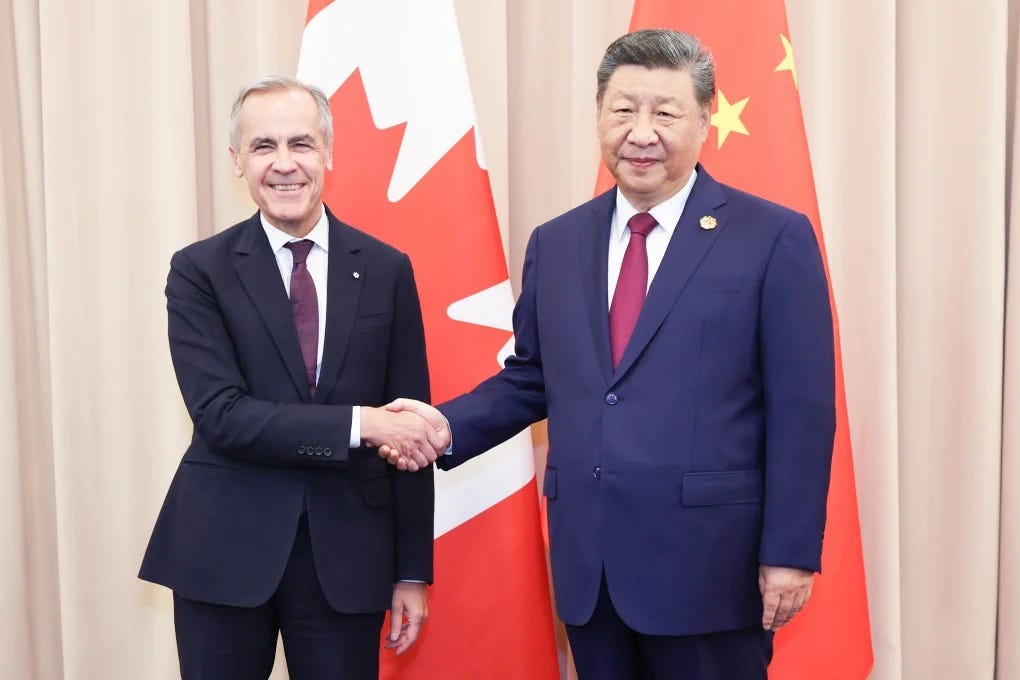How Short-Sighted Politics Is Killing Canada’s Future
Carney’s China Trip, Media Spin, and the Manufactured Split in the Working Class
Canada’s focus shifted this week. Prime Minister Mark Carney met with Chinese President Xi Jinping during the APEC summit in Gyeongju, South Korea. Both sides signaled a thaw after years of tension. They instructed officials to work on specific trade barriers involving canola, seafood, and autos. Ottawa is reviewing tariffs on Chinese electric vehicles, though no agreement has been reached. This alone shows the moment’s weight. It is a test of whether Canada can think long-term or stay stuck in its own politics.
Back home, the media fell into predictable lines. Liberal outlets called it a “diplomatic reset,” emphasizing new markets for farmers and exporters. Conservative outlets warned that Chinese EVs would kill jobs in Ontario’s auto belt. Once again, the message to ordinary Canadians was simple: pick a side. Farmers or autoworkers. That division is nonsense.
Farmers and autoworkers belong to the same class. They both sell labor into markets controlled by capital and policy. Both face unstable prices, rising costs, and governments that use them as bargaining chips. When the media draws lines between them, anger moves sideways instead of upward. And that is exactly how the ruling class likes it.
Electric Vehicles: Disruption and Opportunity
Electric vehicles will shake the industry. That is reality. Some traditional plants will shrink. Some parts suppliers will close. There will be short-term pain. But stopping at fear is weak leadership.
The truth is, EVs create more opportunities than they destroy. Ontario gains from assembly, software, and power electronics. Quebec’s lithium reserves can support a domestic battery industry if investment follows. British Columbia’s clean-energy grid aligns perfectly with EV infrastructure. Alberta’s industrial base can pivot to producing materials and components for new energy systems.
Add logistics, recycling, and energy management, and you have thousands of skilled jobs ready to be filled. Consumers also benefit from lower prices, better models, and safer technology. If we still believe in markets, then let prices do their job. Compete. Build. Improve. Punish dumping where evidence exists, but stop using fear to block progress.
The Real Cost of Short-Sighted Policies
Tariffs feel tough. They poll well. They protect a few factories for one more quarter. But they also raise prices for everyone, delay innovation, and drive investment south to the United States or Mexico. Saving one shift today while losing a supply chain tomorrow is not a strength. It is cowardice dressed as nationalism.
Parliament and provincial leaders are repeating the same split. Ontario’s government shouts about protecting auto jobs. Prairie MPs demand better access for canola and peas. Both are right on their own facts, but both miss the larger truth. Canada is one economy. You do not defend Ontario by punishing the Prairies. You do not help farmers by blocking EV growth. You build both or you lose both.
A Long-Term Path Forward
Canada needs three moves.
First, retraining. Every subsidy and procurement contract must include paid training seats and placement guarantees. Workers move first, not last.
Second, full-chain development. Build complete battery lines in Quebec and Ontario. Expand national charging networks through local contractors. Mandate recycling so that minerals stay inside the country.
Third, policy accountability. Sunset tariffs unless backed by new data. Publish the real cost to households for every protection measure. Make every premier sign off on those costs. Transparency builds trust.
That is how you think long term. Growth comes when competition forces modernization. Wages rise when labor has leverage in expanding sectors. Stability comes when supply chains sit at home, from the mine to the showroom.
Unity Is the Only Strength
Diplomacy opens doors, but it does not decide the nation’s direction. The real power sits with the people who weld, harvest, design, and repair. Farmers and autoworkers are not rivals. They are the same class. They face the same pressures. The fake divide between them keeps this country weak.
Electric vehicles are not a threat to Canada’s future. They are a test of Canada’s courage to evolve. Short-sighted policies will keep the country stuck. Long-run thinking will lift it. The choice is clear.


Thank you for such a beautiful article, I share your goals and ideals, sadly until the Canadian regime begins to step out of colonial status I doubt it will be happening, until then it will only be virtue signaling and tokenism only.
I going to print this out and mail it to Canada's leadership.